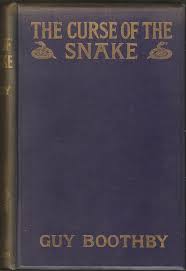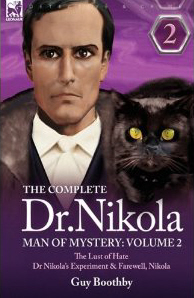Lost Classics of the Pulps: Guy Boothby’s The Curse of the Snake
 The Curse of the Snake is the Guy Boothby title I have been waiting years to read. I previously covered the five books in his Dr. Nikola series as well as his 1899 novel, Pharos the Egyptian for Black Gate. Boothby is an author whose works have fallen into relative obscurity, but his influence was quite pervasive. A contemporary of Sir Arthur Conan Doyle and Bram Stoker, he turned out works that stand up well against their more celebrated efforts. Most importantly, the influence of Dr. Nikola is felt heavily upon Sax Rohmer’s Fu Manchu series and the character of Ernst Stavro Blofeld from Ian Fleming’s James Bond novels. Boothby’s great flaw was that he was a prolific author of serialized novels who made no effort to correct inconsistencies when his works were published in book form. This hurt his reputation and, along with the speed with which he produced new works, unfairly suggested he was little more than a hack.
The Curse of the Snake is the Guy Boothby title I have been waiting years to read. I previously covered the five books in his Dr. Nikola series as well as his 1899 novel, Pharos the Egyptian for Black Gate. Boothby is an author whose works have fallen into relative obscurity, but his influence was quite pervasive. A contemporary of Sir Arthur Conan Doyle and Bram Stoker, he turned out works that stand up well against their more celebrated efforts. Most importantly, the influence of Dr. Nikola is felt heavily upon Sax Rohmer’s Fu Manchu series and the character of Ernst Stavro Blofeld from Ian Fleming’s James Bond novels. Boothby’s great flaw was that he was a prolific author of serialized novels who made no effort to correct inconsistencies when his works were published in book form. This hurt his reputation and, along with the speed with which he produced new works, unfairly suggested he was little more than a hack.
